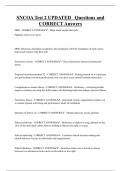Exam (elaborations)
SNCOA Test 2 UPDATED Questions and CORRECT Answers
- Course
- Institution
SNCOA Test 2 UPDATED Questions and CORRECT Answers DDR - CORRECT ANSWER- Helps teach airman their jobs Happens early on in career DDR: Direction, discipline recognition, the foundation of P2 the foundation of early career helps teach Airmen who their jobs Profession of arms - CORRECT ANSWE...
[Show more]



